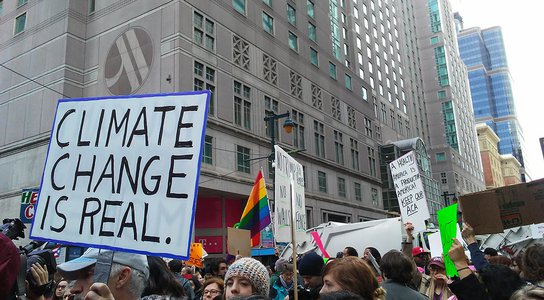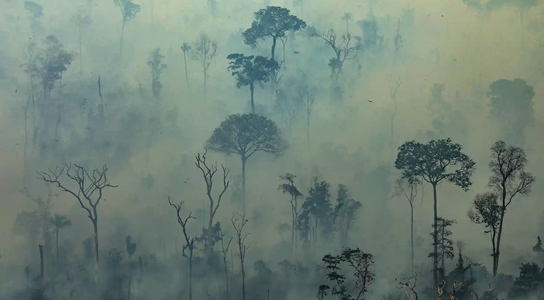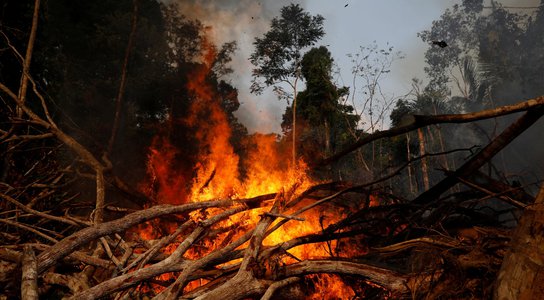Could today's climate strike come at the most crucial moment for UK yet? At the cusp of a General Election and ahead of a year of climate action for the COP climate conference in Glasgow, the pressure from our young people striking across the country continues to grow.
Many pundits have pointed towards this General Election being a “climate election” and parties are taking various routes to boost their environmental credentials. Proposals from Labour and the Lib Dems could create radical shifts in the responsibility of companies and financial institutions for their environmental and human rights impacts, while the Conservatives have pledged international partnerships to tackle deforestation.
While these politics play out, a little-publicised government task force called the Global Resources Initiative (GRI) is grappling with what action the UK can take when it comes to its supply chains and the huge amounts of deforestation and carbon emissions it is linked to.
Everyday products consumed in the UK – soy, palm oil, rubber – are linked to a high risk of destructive deforestation abroad. And just for imports of soy, palm oil, pulp & paper, timber, beef, leather, rubber and cocoa, the forested land area at risk of destruction is equivalent to roughly half the size of the UK, and six times Wales. This figure alone makes it vital the UK works to have a lighter and far less destructive footprint on the world’s environment.
But it’s not just the UK’s consumption that takes its toll on the planet. The country’s financial sector also plays a crucial role providing funds to companies associated with deforestation. Global Witness recently documented how UK banks provided £5 billion between 2013-2019 in financing or other backing to six of the worst agribusiness companies involved in the destruction of climate-critical forests. This made UK banks the single largest source of international credit, second only to Brazil.
Against this bleak picture of money pumped through UK banks fuelling deforestation, the GRI taskforce are putting together proposals for a landmark year. 2020 is the target year that hundreds of agribusiness companies – and a handful of banks – have promised to deliver on zero net deforestation commitments made by the Consumer Goods Forum and Banking Environment Initiative. Horrifyingly, it’s doubtful that any company will meet these targets. Self-regulation has clearly failed.
As well as setting out options for UK policy on its international supply chains and their impact on forests and the environment, the GRI taskforce proposals will set the tone for the country hosting the 2020 COP climate summit. It must form policies against the backdrop of the Intergovernmental Panel on Climate Change, and various scientific reports in 2019, highlighting how deforestation and land-use change are major drivers of climate change and mass extinctions.
So it’s important that any proposals match the scale of the challenge: and that they crucially include a key policy called mandatory due diligence requiring companies, including financial institutions to understand and take action to mitigate and prevent environmental harm and human rights abuses associated with their operations, supply chains and financial relationships. This is crucial for forest-risk commodities like soy, palm oil and beef – in order to start tackling some of these worrying predictions.
The UK won’t be the first country to do so. Already the EU is exploring due diligence legislation in an effort to tackle its imported deforestation and France already has an imported deforestation strategy in place and reporting requirements for French businesses. To truly lead, the UK’s GRI taskforce needs not only to recommend clear mandatory due diligence – it needs to unequivocally cover the entire supply chain, including finance – signalling that if UK importers aren’t allowed to profit off deforestation, UK banks shouldn’t be allowed to either.
What tropical forests, and the people who care for them, most need are for companies and individuals to be held to account for the impacts of their operations, investments and supply chains – wherever they are in the world.
86% of those polled in the UK earlier this year agreed that new laws are needed to ensure the products sold here do not contribute to global deforestation. This was even before the media storm on this year’s Amazon fires.
While the GRI taskforce is made up of key NGOs, it also includes big name companies with patchy records when it comes to deforestation. Against this backdrop, the taskforce needs to take care to steer clear of tired and discredited claims that we can solve the deforestation crisis by trying to encourage companies, including banks, to develop ‘green products’ – without challenging the market rules that reward those seeking to profit of deforestation, land rights abuses and forest-related violence.
Without strong proposals that can make a difference, talk of “sustainable finance” will look like a cynical attempt to distract attention from the continuing flow of funds that help companies plough through forests, destroy wildlife and damage homes.
With an area of forest equivalent to over 6 times the size of London destroyed in Brazil in the last 12 months alone, the call could not be clear: the UK needs to act, and it needs to act now.


